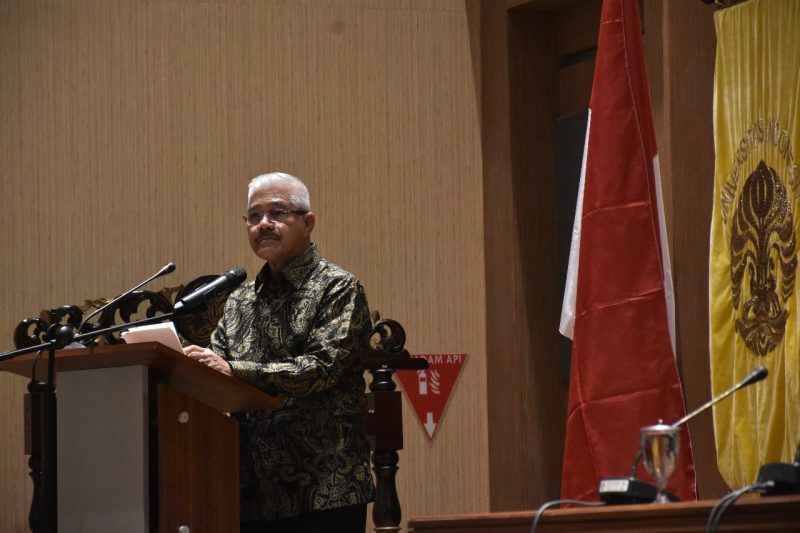Chief Justice: Legal Counsel of Defendant Ranks the Highest Number of Filing Reconsideration on Corruption Case
The annual event of the Indonesian Criminal Law and Criminology Society was opened. The event held a discussion on corruption eradication from various criminal aspects.
The national seminar organized by the Criminal Law and Criminology Society (MAHUPIKI) on the FHUI campus, Depok on Monday (2/18) specifically raised the theme ‘Criminal Law Policy in Eradicating Corruption in Indonesia’. Attended by hundreds of participants from all over Indonesia, this seminar presented the Chief Justice of the Supreme Court, HM Hatta Ali, as the keynote speaker.
In his keynote address, Hatta Ali explained that eradicating corruption is a reform agenda that has been carried out for decades. Various policies were issued, including establishing new institutions, the number of people who were prosecuted due to corruption crimes continued to increase. “But the efforts made have not yet achieved satisfactory results,” he said in front of hundreds of lecturers, legal practitioners and law students who packed the Djokosoetono FH UI auditorium.
Hatta then pointed to evidence of corruption cases that went to the Supreme Court. Data from last year showed that more than 200 corruption cases filed for appeal. Interestingly, corruption cases were the most requests in a special criminal field that are submitted for reconsideration (Peninjauan Kembali—PK) in 2018. Out of 662 special criminal cases at the PK level, 208 cases were corruption cases. “Corruption is quite a lot of cases,” explained the Chief Justice of the Supreme Court, the professor said. “Sometimes it becomes a question mark,” he continued.
In particular, Hatta Ali mentioned the ‘phenomenon’ of the many PK applications that were submitted to the Supreme Court after supreme judge Artidjo Alkostar retired. Judging from the parties who submitted it, legal counsel or defendants submitted more Reconsiderations than public prosecutors. However, he did not elaborate on what the prosecutor had put forward, how many were submitted by legal counsel or defendants. “Especially after Pak Artidjo retired,” he said.
Artidjo Alkostar is a well-known ‘fierce’ judge in sentencing criminal cases of corruption. A number of defendants in corruption cases received far more severe penalties at the cassation level or PK when handled by a panel of judges chaired by Artidjo. Artidjo has punished “severely” a number of perpetrators of corruption cases, causing fear for the defendants who wanted to appeal. After Artidjo retired on May 22, 2018, a number of corruption convicts filed for Reconsideration.
The amount of appeals for cassation and Reconsideration of corruption cases recognized by Hatta were enough to make the Supreme Court judges overwhelmed. There was a question mark whether because the judge sentenced him too lightly or even too heavy. He gave an assessment to the community. The Supreme Court wanted to ensure that the eradication of corruption is carried out systematically and continuously.
Trident
In another part of his speech, Hatta Ali talked about the importance of improving the legal system through the structure, content and legal culture. In terms of structure, there were issues of enforcement authority that were very plural. There were three institutions that were authorized to prosecute corruption cases, namely the police, prosecutors and the Corruption Eradication Commission (KPK). Supposedly, these three institutions were like trident powers.
The problem was, Hatta criticized, with the existence of several competent institutions, coordination between institutions had not been optimal. The authority for supervision in the hands of the KPK given by Law No. 30 of 2002 concerning the Corruption Eradication Commission, in practice it gave birth to conflict. Hatta gave an example of the conflict between the National Police and the Corruption Eradication Commission, or the submission of a judicial review of Article 30 paragraph (1) of Law No. 16 of 2004 concerning the Prosecutor’s Office of the Republic of Indonesia. These two cases showed conflicts with nuances of authority disputes between law enforcement agencies. “This is counterproductive to eradicating corruption,” he said.
In terms of substance, Hatta Ali talked about the importance of amending the Corruption Eradication Law so that the material contained in the United Nations Convention Against Corruption (UNCAC) could be incorporated. The Deputy Chairperson of the KPK Laode M. Syarif also acknowledged that there was substance in the UNCAC that needed to be adopted into the rule of combating corruption.
“Not all UNCACs have been adopted. But with ratification, Indonesia binds itself (to the UNCAC provisions),” Laode said.

